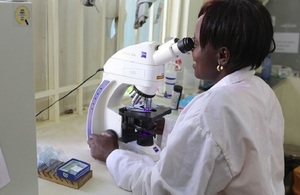UK leads the fight against increasing drug resistant TB
The UK has committed to leading the fight against tuberculosis (TB), one of the world’s deadliest diseases, through funding research into three new treatments.

International Development Secretary Penny Mordaunt announced at the UN General Assembly yesterday (Wednesday 26 September) that UK aid will be dedicated to developing shorter, safer and more effective treatments for TB.
These new treatments could also help tackle the rise of drug resistant TB. In 2017 an estimated 600,000 people developed drug resistant TB but the success rate with current treatments is 55 per cent - making it a major public health crisis.
Scientists and health workers in developing countries are constantly battling to combat this leading killer infectious disease, with mortality rates being higher in low income countries such as Mozambique and the Central African Republic.
This latest support for the TB Alliance will help develop new, safer drugs for the disease, which last year infected 10 million people.
Speaking after a high-level meeting on TB at UNGA yesterday Ms Mordaunt said:
TB is the biggest killer among infectious diseases globally. The UK is already leading the way to tackle TB through investment in research and development. UK aid will help develop three new TB drugs, which offer quicker-acting treatments for the millions of people affected by drug-resistant TB each year.
The work of our expert scientists is bolstering our efforts to ensure we can tackle these diseases that do not respect borders. It is a win for the UK and a win for the developing world.
The UK government has been clear this research alone is not enough to meet the Global Goal target to end TB by 2030. That is why Heads of State will meet at the high-level meeting at UNGA to sign a political declaration, signalling a step-change in the international leadership and commitments necessary to drive progress on fighting TB.
DFID has also supported Aeras, a non-profit organisation working with GSK and other partners, to develop and test a new TB vaccine. Early results show the number of HIV-negative people developing TB was reduced by about half.
The UK already provides substantial support to international organisations, including the Global Fund, Unitaid and world-class research to develop new health products. These investments support large-scale TB programmes and critical research into innovative new medicines and diagnostics to help tackle TB. The UK’s work in strengthening country health systems also plays a vital role in tackling the disease.
Yesterday the University of Oxford also announced its team of scientists and global experts have led a major breakthrough in the understanding of TB’s genetic code. Their research has the potential to shape how TB is diagnosed in the future to make sure the right drugs are prescribed.
Dr Timothy Walker, Academic Clinical Lecturer in Infectious Diseases and Microbiology at the University of Oxford, said:
This is a new exciting era for TB diagnostics. These advances will soon mean those suffering with TB can get individual treatment that is right for them to help them fight the disease, moving beyond treating patients on a “best guess” basis.
Public Health England announced this week TB rates in England have dropped to the lowest level since 1990. The data showed a 38 per cent drop in new diagnoses from the peak in 2011 to 2017 (from 8,280 to 5,102).
Notes to editors
- £7.5 million new UK aid support has been given to the TB Alliance to develop shorter, simpler treatments against TB that are affordable to the poorest countries in the world.
- The latest figures on TB published by the World Health Organization show that in 2017, 10 million people developed this preventable and treatable disease and 1.6 million people died.
- Through our support to the Global Fund in the fourth replenishment round (2014-2016) the UK ensured TB treatment was provided to 1.26m people worldwide.
- The UK supports the Foundation for Innovative New Diagnostics, which is developing new diagnostic tests for TB. Funding to date has included support for the highly successful GeneXpert test, which is now used in 140 countries, including the UK, to help improve diagnosis for TB.
General media queries (24 hours)
Email [email protected]
Telephone 020 7023 0600
If you have an urgent media query, please email the DFID Media Team on [email protected] in the first instance and we will respond as soon as possible.